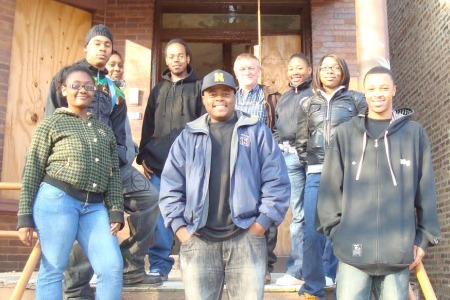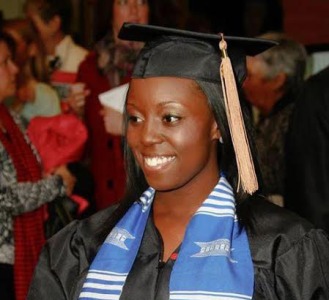
The number of career and technical programs in Chicago public schools has declined, with Simeon Career Academy’s electricity program being the latest to be cut. With the high youth unemployment rate in Chicago, some say that the program cuts will limit job opportunities even more for those graduates because not everyone chooses to go to college.
Landing a job that requires at least a bachelor’s degree isn’t a choice for some of these students because not all of them take the traditional academic path. Career academies have always been another option for youth, especially minorities, who fall into that category said John Michael Johnson, a Simeon alumnus and the founder of Project Simeon 2000–a not for profit organization that links what is being taught to students with what is needed by industries/employers located in Chicago.
Johnson, who graduated more than three decades ago, said that many people from his class, who took the vocational classes, ended up working in that field after high school.
“A kid who goes to Simeon and does what they’re supposed to do will be prepared for work and college,” Johnson said. “To remove the option to go into the electrical field, you are taking away a valuable option for our children.”
Joe Wells, a Local 134 member and Electrical Workers Minority Caucus Chicago chapter president agreed.
“Being exposed to that gives our children an opportunity to see different things that they can be involved in from an occupational standpoint,” said Wells, who graduated from Simeon in 1981.
According to a report by a non-profit organization, youth unemployment in Chicago is high, with Black teens being the most affected. Chicago Alternative Schools Network released a report in January as a part of an ongoing series that focused on employment issues for teenagers 16 to 19. The report looked at years 2006-2012. It said that 92% of all Black males between ages 16 and 19 in Chicago were unemployed in 2012. In the state, only 16 out of 100 Black teens had a job, and in Chicago there were only 11 employed out of 100. The employment rate nationwide for all Black teens has continued to decline, dropping from 25% in 2006 to 18% in 2012. Black teens are doing worse that Hispanics and Whites in the job market, the report said.
Without as many career program options, some might get left behind, Johnson said.
“You have a kid who may be standing on corner because he knows he’s not going to college,” Johnson said. “Well Johnny didn’t read well in grammar school and in high school he was called a dummy so what can he do?”
The Youth Job Center in Evanston offers technical classes to young adults 19 to 25. The automotive instructor, Tom Sprengelmeyer, said he was one of those students who didn’t know what he wanted to do after school, but recognized he was good at fixing cars. After a bumpy path, full of trials and errors, he finally ended up teaching young adults who come from all over Chicago. Having technical programs in high school is necessary Sprengelmeyer said.
“Technical skills help people who would have fallen through cracks in other areas of school find ways to succeed,” he said. “These are jobs you can’t remove from the neighborhood or city and put somewhere else because if you need a mechanic or electrician, you can’t call someone and have them fix it over the phone.
“You can’t outsource, they are always going to be here,” Sprengelmeyer said.
When Simeon announced last week that it would no longer offer the electricity and automotive technology programs due to lack of interest from incoming freshmen, the community protested.
Sen. Jacqueline Y. Collins (D-Chicago 16th) released a statement.
“What our young people need most is hope for the future, and vocational programs that offer pathways to the trades provide that hope for many students,” she said. “ I was disappointed to learn last week that Simeon’s electrical program, the only one of its kind remaining in the Chicago Public Schools, had been terminated.”
Amara Enyia, who plans to run for mayor this fall, said CTE programs are important because more jobs require those skills.
“We should be expanding these programs in CPS because our economy requires it,” she said. “Without a strong vocational education program we will not be preparing kids for the economy.”
Because CPS allows individual schools to terminate programs when enrollment declines, Simeon’s principal, Sheldon House, decided to cut both CTE programs. The goal is to always have at least 85 students per program, House said, but only 57 were in the electricity program this year, with 5 percent earning qualifying certifications. The automotive technology program had 54 students this past school year and less than 5 percent earned qualifying certifications. For fall 2014, only 18 of the 370 incoming freshmen expressed interest in the Electricity program as their top program, CPS spokeswoman Lauren Huffman said.
Latisa Kindred has taught Simeon’s electricity class for the past seven years and she said had no idea the school would let her go. The class gave many of her students exposure to a field they might not have gotten without her, she said.
“They are competing with people who are sons and daughters of third generation electricians,” Kindred said.
She kept track of her students. Documents show that 19 students took the Occupational Safety and Health Administration certification and of that 19, 15 graduated. Of the graduates, 93 percent became OSHA 10 hour construction certified. Only 13 of the 15 graduates were considered electricity students during the full 3-year program. Students take the class sophomore, junior and senior year. Two of her students started out in machine shop. For the 13 who successfully completed the three year course, 12 graduated as OSHA 10 hour construction certified.
Kindred said her class prepares students for next level, which is usually an apprenticeship. Just last year, two of her students got accepted into the union.
CPS spokesman Joel Hood said, “CPS continues to work to enhance our CTE program offerings to provide students an opportunity to attain nationally-recognized certifications and technical skills that will meet the demands of a 21st century economy upon graduation. Each year, we undergo a comprehensive review of these programs to deliver a portfolio of diverse career pathways, as we seek to prepare students with both the applicable skills and academic foundation they need to succeed in college, career and in life.”
Students in Kindred’s class weren’t just reading from textbooks, but they were getting real life experience and networking, the teacher said. She worked with people in the field who would visit the classroom, or invite the class to work sites.
For example, Johnson created Project Simeon 2000, a non-profit organization he founded in 1989. He wanted a space for the high school’s alumni to gain more experience. During the school year, Kindred’s electricity class would help rehabilitate old buildings in the community with him and volunteer contractors. Wells said he has spoke to KIndred’s class for the past seven years.
This year there were a total of 57 students and like previous classes, they were able to participate in mock interviews, as well as get real work experience.
One of Kindred’s former students, Tarsha Moore, graduated in 2009 and said taking that class got her interested in the management side of electrical engineering.
“Coming out of high school I got accepted in the Local 134 apprenticeship, but I wanted to go to school,” she said. She graduated from Southern Illinois University, Edwardsville, December 2013 with a BA in business administration.

Moore said Kindred was always exposing her students to different job related opportunities. The recent graduate said before meeting Kindred, she was strongly considering dropping out of school. “She always motivated me to be the best that I could be,” Moore said.
Another Simeon graduate, Takia Butler, decided to not pursue electrical engineering, but said it was nice to have the other career option.
“I feel like for those who don’t have college in their future, she taught us and prepared us for if we had went and pursued the apprenticeship, we wouldn’t have gone into it blindly,” said Butler.
She graduated from Eastern Illinois University the past May, where she received her B.S. in Family and Consumer Sciences.
Revin Fellows, COO of non-profit Books Over Balls, an organization which encourages youth to focus more on their education, is also a community activist for Black contractors. He said there are jobs out there for these young people, but they need to get exposed to the training early on.
Simeon will hold another public meeting Thursday, July 31 at 6 p.m. The meeting will address why the two programs have been removed.
“I want to challenge any black construction guys in the trade, they can’t sit back and let this program close, we are calling all contractors, tradesmen, laborers, whatever you do in the trades, you should be at simeon Thursday to have the conversation,” Fellows said.